![]()
Maintaining optimal oral health is crucial for overall well-being. Regular teeth cleaning not only enhances your smile but also prevents various dental issues. If you’re searching for “dental cleaning near me” in Houston, you’ll find all the information you need here.
Are you due for a routine check-up or dealing with stubborn tartar buildup? Finding “reliable teeth cleaning near me” is the first step. Professional cleanings go beyond what regular brushing and flossing can achieve. They target hard-to-reach areas and detect early signs of dental problems. With the right dental team, you can enjoy a cleaner and brighter smile.
Suffering from gum disease? Get the deep cleaning treatment from our expert dentists. You will notice the optimal results within a few months. Still unsure? See the photos of deep cleaning teeth before and after, and decide for yourself.


Plaque builds up fast, and waiting only makes it worse – let’s get your smile fresh and healthy today!
As we said, even with regular brushing and flossing, it’s nearly impossible to remove all the plaque and food particles trapped in the tight spaces between your teeth and along the gumline. Over time, this leftover debris hardens into tartar, a substance that cannot be removed with a toothbrush. If left untreated, this buildup becomes a breeding ground for harmful bacteria that lead to gum inflammation, bad breath, tooth decay, and other oral health issues.
Skipping regular professional teeth cleanings allows these issues to escalate. What starts as minor gum irritation can develop into gingivitis—the earliest stage of gum disease. If left unchecked, gingivitis can turn into periodontitis, a serious condition that can damage your gum tissue, weaken bone support, and even lead to tooth loss. You may also experience tooth sensitivity, swelling, and chronic discomfort that can disrupt your daily life.
Ignoring your search for “teeth cleaning near me” today could mean facing more complex, painful, and expensive dental treatments tomorrow.
Professional dental teeth cleaning is a safe and effective way to remove plaque and tartar from your teeth and gums. During a cleaning, your dental hygienist uses specialized tools to reach areas your toothbrush can’t, eliminating buildup and reducing the risk of gum disease and tooth decay. It also helps prevent future cavities, keeps your breath fresh, and brightens your smile by removing surface stains.
At URBN Dental, our skilled dentists and advanced equipment ensure a thorough cleaning experience.
Don’t wait for tooth pain or gum problems to get worse. Book your teeth cleaning with URBN Dental today and enjoy expert care and a refreshed, healthier smile.
Regular cleanings are the best way to keep your smile in top shape. Let’s get you scheduled!






Keep cavities and gum issues away—schedule your cleaning today!
Wondering what to expect when you search for “dental cleaning near me” in Houston or book your first teeth cleaning appointment? Understanding the process can ease your nerves and help you feel more confident walking into the clinic.
Here’s a step-by-step breakdown of what happens during a professional dental cleaning at URBN Dental:
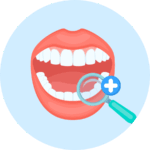
Your dental cleaning begins with a thorough examination of your mouth. A licensed dental hygienist will inspect your teeth, gums, and tongue using a small mirror to look for any early signs of gum disease, decay, or other oral health concerns. This crucial step ensures you’re a good candidate for teeth cleaning and helps the team tailor the procedure to your specific needs.
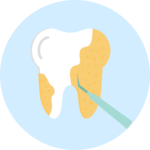
Plaque is a sticky film of bacteria that forms on your teeth every day. Using a dental scaler, the hygienist gently scrapes away plaque and tartar buildup around your gumline and between your teeth. The amount of buildup determines how long this step takes. This is one of the most crucial aspects of the teeth cleaning process, as it helps prevent cavities, gum inflammation, and serious infections.

After the plaque and tartar are removed, your hygienist will clean your teeth using a high-powered electric toothbrush and a gritty toothpaste. This polishing step removes any remaining plaque and surface stains, leaving your teeth feeling fresh and smooth. The process adds that final shine to your smile.
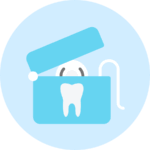
Next comes a professional flossing session. Unlike at-home flossing, this is done using specialized tools that reach deep between your teeth and below the gumline. It’s designed to remove hidden debris and plaque while also checking for potential gum sensitivity or bleeding. Your hygienist may offer tips to improve your at-home flossing habits and recommend products that suit your oral health.
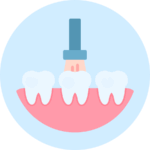
To strengthen your teeth and help protect against future cavities, your visit will end with a fluoride treatment. A gel or foam is applied using a tray that fits comfortably over your teeth. This is followed by a fluoride varnish that hardens quickly once it comes into contact with your saliva, forming a long-lasting protective shield. This step is especially important if you’re prone to cavities or have sensitivity, and it’s a common part of many dental cleaning services.
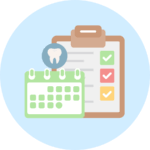
Finally, your dentist will review your X-rays (if taken), examine your mouth, and discuss any issues found during the cleaning. They’ll share personalized advice on improving your oral care routine, suggest treatments if needed, and help you plan your next visit, usually in six months or so.
By the end of your appointment, you’ll walk away with a cleaner, healthier smile and a better understanding of how to keep it that way.
Say goodbye to plaque and hello to freshness—book your cleaning!
Many individuals underestimate the importance of regular dental cleanings. Regular teeth cleanings offer numerous benefits, including:
Enhanced Overall Health: Good oral hygiene is linked to better overall health, reducing the risk of heart disease and other conditions.
When was your last dental cleaning?
Most patients benefit from cleanings every 6 months. The dentist may recommend increased frequency to those with a history of gum disease and heavy tartar accumulation.
Some pressure or sensitivity may be experienced, especially if you haven’t had a cleaning done in a while. However, our team does its utmost to keep you comfortable throughout every step of the procedure.
A regular cleaning removes plaque and tartar above the gum line. A deep cleaning goes below the gums to treat gum disease by removing bacteria and smoothing the tooth roots.
Most PPO dental insurance plans cover routine cleanings twice a year, and URBN Dental is in the network with most providers. We will assist you in understanding and maximizing your benefits.
No judgement! We accept all patients, regardless of the gap in their dental visits. The sooner you book, the sooner we can restore and protect your smile.
Houston | Katy | Montrose | West University Place | Greater Third Ward | Greater East End | North East Houston | Houston Heights | Central Northwest | Fairbanks | Acres Home | East Houston | Southeast Houston | Central Southwest | Fort Bend Houston | Brays Oaks | Meyerland Area | Sharpstown | Alief | Westchase | Memorial | Northwest Houston | Katyland | Whispering Lakes | Pine Lakes | Woodcreek Reserve
No Insurance? No problem.
© Copyright 2025 | Designed & SEO Optimized by The Doctors Marketing
Disclaimer: URBN Dental uses restorative materials such as Admira Fusion® by VOCO, which are free of BPA and Bis-GMA, and are not known to degrade into microplastics under normal oral conditions. While marketed as biocompatible and free of traditional plastic monomers, no dental material is guaranteed to be completely risk-free for all patients. This information is provided for educational purposes and does not constitute medical or regulatory advice.

Discover your perfect smile with a FREE Invisalign assessment.

Receive a complimentary 3D scan ($300 value) when you proceed with implant care.

Speak with our experts about your smile goals from the comfort of your home.
Discuss your smile goals with our experts—choose an in-office visit or a convenient 15-minute phone consult.

Quick, affordable care when you need it most.

Have questions about implants? Get personalized guidance in a brief phone call.